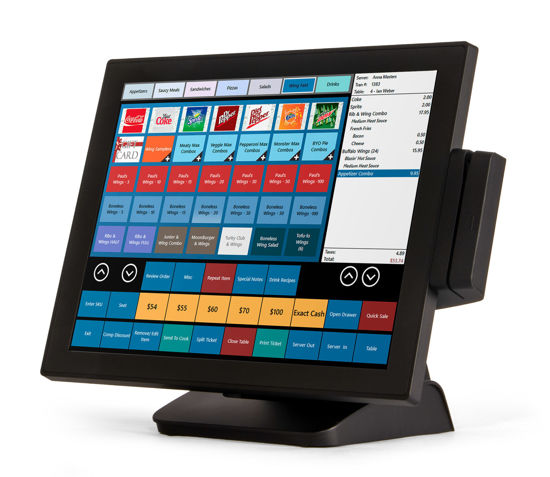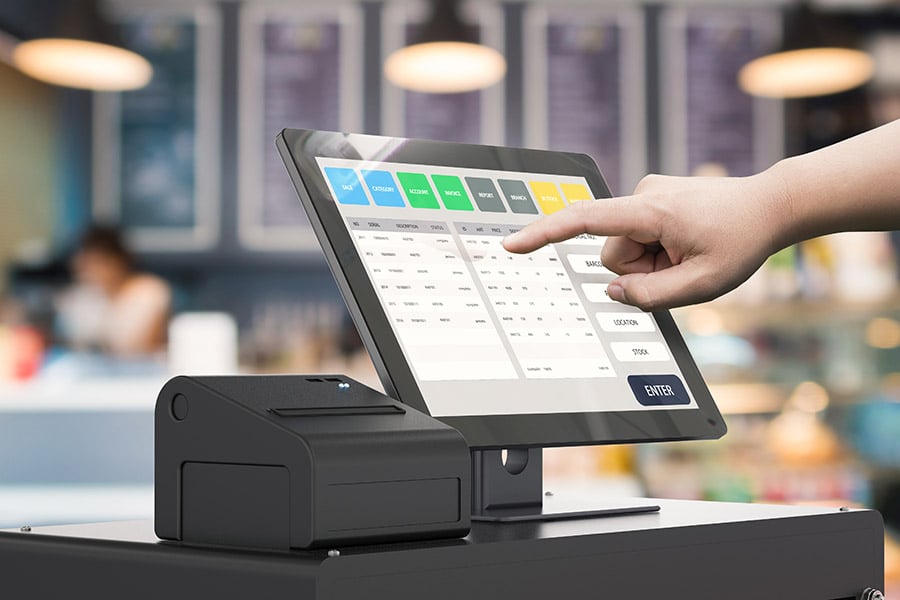The Buzz on Pos Software
The Buzz on Pos Software
Blog Article
Things about Pos

POS Machine: Retail Point-Of-Sale Solutions Streamline Transactions
The 15-Second Trick For Pos

Hardware Parts of a Point of Sale System What makes a POS system tick? It's not just software application; the hardware plays a starring function. Think about it as the body to the software's brain. Without the best hardware, even the most advanced POS software is just a quite face. Essential POS Hardware So, what are the must-haves? Let's break it down. The central processing unit, often a computer or tablet, is the heart of the operation. The monitor or touchscreen show allows staff to connect with the system. A barcode scanner accelerate the checkout procedure. Remember the days of manually entering each code? The trusty receipt printer supplies customers with a record of their purchase. A cash drawer keeps your cash safe and organized. A card reader permits consumers to pay with credit or debit cards. Diving Deeper: Beyond the Fundamentals But wait, there's more! Depending upon your organization, you may require specific hardware. For example, a restaurant may incorporate kitchen printers to relay orders, while a retail shop may utilize label printers for product tagging. Ever question how your local bakery instantly prints those delicious-looking labels? Picking the Right Hardware: A Balancing Act Picking the ideal hardware isn't almost buying the most expensive devices. It's about finding the sweet spot in between performance, durability, and budget. A little business simply beginning may choose a more standard setup, while a high-volume retailer will need robust, high-performance machines. Is it much better to buy brand-new or used? Consider your choices thoroughly. A new here system uses the newest technology and guarantee security, however a reconditioned system can conserve you money. The Future of POS Hardware What does the future hold? Expect to see even more combination with mobile phones, biometric scanners for staff member authentication, and advanced analytics dashboards displayed on bigger, clearer screens. Think of a world where inventory is automatically upgraded in real-time as products are scanned-- a world where you can track your best-selling product from throughout the world. The possibilities are endless, and the hardware is constantly evolving to satisfy the demands of today's organizations. Are you all set to upgrade your point of sale system?
Software Application Characteristics and Capabilities: The Heart of Your POS System
Ever see a seasoned barista slide through a hectic early morning rush? Their secret isn't simply caffeine; it's a smooth dance with their POS system. The software is the conductor of your company symphony, orchestrating whatever from sales to inventory. What notes should you be listening for? What capabilities truly matter in today's market?
Inventory Management: Beyond Counting Beans
Forget spreadsheets that haunt your dreams. Modern POS systems provide real-time stock tracking, alerting you when your stock of artisanal coffee beans dips precariously low. Think about it as a digital guardian angel, avoiding those uncomfortable "Sorry, we're out!" moments to clients. What if you could likewise forecast need based on historical data? Many systems now use forecasting tools, a powerful weapon versus overstocking and lost sales. This helps prevent the predicament of running out of popular items or collecting excess inventory of slow-moving products, both of which can constrain cash circulation and space.
Sales Reporting and Analytics: Deciphering the Data
Sales data is the new gold, and your POS system is the miner. Forget feeling in one's bones how much you offered today. Dive deep into the data to reveal trends, identify your best-selling items, and understand consumer behavior. Which menu item sets perfectly with the day-to-day special? Which promotion resonated most with your customers? These insights are not just fascinating; they're actionable intelligence. Without dependable sales reporting, browsing the intricacies of organization decision-making becomes like sailing without a compass, increasing the chance of bad moves and missed out on chances.
Customer Relationship Management (CRM): Structure Bridges, Not Walls
Keeping in mind a regular client's name and preferred order is captivating, however scaling that personal touch is difficult. POS systems with CRM abilities allow you to track client purchase history, choices, and even birthdays. Think of instantly offering a discount rate on their birthday-- a little gesture that promotes loyalty and encourages repeat organization. There is the prospective snag of bad data quality, which can lead to inaccurate client profiles and inefficient marketing efforts.
Payment Processing: Improving the Transaction
The checkout experience can make or break a sale. Smooth combination with various payment methods-- credit cards, mobile wallets, even copyright-- is non-negotiable. Can your system manage split payments? Does it provide secure tokenization to secure consumer information? A cumbersome payment procedure is like hitting a sour note in your organization symphony, possibly interrupting the entire efficiency. Making sure compatibility with progressing payment innovations and adherence to security requirements are paramount for preserving consumer trust and functional effectiveness.
Worker Management: Keeping the Group in Sync
From clocking in and out to handling authorizations and tracking efficiency, staff member management includes enhance operations and improve responsibility. Is scheduling a problem? Lots of POS systems provide integrated scheduling tools, optimizing staffing levels based upon forecasted demand. A common obstacle that is often overlooked is the challenge of integrating worker management functionalities with payroll systems, which can result in mistakes and ineffectiveness in wage calculations.
Advanced Characteristics: Leveling Up Your Operations
- Table Management: Suitable for restaurants, this feature enables you to visualize your dining-room, track table status, and handle appointments.
- Loyalty Programs: Reward your best consumers and motivate repeat organization with incorporated loyalty programs.
- Online Buying Combination: Effortlessly integrate your POS system with online ordering platforms to expand your reach.
Picking the ideal POS system has to do with more than just performance; it has to do with discovering a partner that can grow with your business. Consider your present requirements, expect future growth, and don't hesitate to ask the difficult concerns. The best software application can change your organization from a chaotic cacophony into an unified work of art.
Industry-Specific POS System Applications
Think about the local pastry shop, busy with morning customers craving fresh croissants. A generic POS system might manage deals, however can it handle intricate dishes, track component inventory, or instantly change production schedules based on sales information? Probably not. That is where the beauty of industry-specific POS systems shines.
Dining establishments and Hospitality
For bustling dining establishments, speed and accuracy are critical. The number of times have you seen servers handling orders, modifications, and splitting expenses, all while trying to offer outstanding service? A restaurant POS system improves these procedures, permitting table management, cooking area order tickets, and even online ordering combination. These systems often consist of functions like ingredient-level stock tracking, vital for managing food expenses and reducing waste. Ever wonder why your favorite meal is in some cases not available? It may stem from a lack of proper stock management.
- Table Management
- Kitchen Area Order Tickets
- Online Buying Combination
- Ingredient-Level Stock Tracking
Retail Solutions
Retail, with its diverse inventory and client interactions, demands a various set of tools. Think of a shop clothing shop having a hard time to track sizes, colors, and seasonal collections using a fundamental checkout system. An industry-specific retail POS system offers functions like barcode scanning, customer commitment programs, and in-depth sales reporting. These systems can even integrate with e-commerce platforms, supplying a seamless omnichannel experience for consumers. Did you understand some retail POS systems can anticipate future sales trends based upon historical data? Now that is powerful!
The Perils of an Inequality
Selecting the incorrect POS system can develop considerable functional obstacles. A clothes boutique utilizing a dining establishment POS, for instance, would discover it unsuitable for managing inventory with sizes and colors. The lack of proper reporting and analytics might result in mistaken purchasing choices and lost revenue. The result might be similar to attempting to fit a square peg in a round hole.
Key Considerations
Selecting an industry-specific POS system needs mindful assessment. Consider your company's unique needs and operational workflows. Does the system integrate with existing software application? Does it use the necessary reporting capabilities? Is it scalable to accommodate future growth? A well-chosen POS system is not just a deal tool; it's a strategic asset that can drive effectiveness, improve client complete satisfaction, and ultimately, improve your bottom line. Remember, it is an investment in your company's future, not just an expenditure.
Security Factors To Consider for Point of Sale Systems
Ever heard the tale of the mom-and-pop shop that lost everything since of a single, ignored security flaw in their POS system!.?. !? It's a cautionary tale, and it highlights a crucial aspect typically eclipsed by the attraction of expensive features and structured operations. The reality is, a POS system is just as excellent as its security. What great is a system that crunches numbers in a flash if it enables bad guys to swipe client's information simply as quickly?
The Vulnerability Minefield
The digital landscape is a battlefield. Every POS system, no matter size or sophistication, is a potential target. Are you genuinely got ready for the hazards prowling around the corner? The real pinch comes when you discover that your out-of-date software has an open hole that hackers can make use of, turning your business into an unwitting accomplice in identity theft. The difficulty is that hackers are crafty and are constantly changing their strategies.
Common Security Spaces and Expert Tips
- Weak Passwords: "Password123" isn't sufficing. Usage strong, unique passwords for all POS system accounts and alter them regularly. Two-factor authentication is a must.
- Unsecured Networks: Your Wi-Fi resembles leaving the front door open. Protect your network with strong file encryption (WPA3 if possible) and consider a separate network for your POS system.
- Out-of-date Software Application: Software vendors spot security holes all the time. Stopping working to upgrade is like inviting problem. Establish automatic updates or schedule routine upkeep.
- Worker Training: Your personnel is your first line of defense. Train them to recognize phishing efforts, safeguard passwords, and report suspicious activity.
Information Encryption: Your Guard Versus the Dark Arts
Consider information encryption as a secret code. It scrambles sensitive info, like charge card numbers, making it unreadable to unauthorized users. Without encryption, your clients' monetary details resemble sitting ducks, ripe for the picking by cybercriminals. It's not simply about securing your consumers; it has to do with securing your reputation and preventing significant fines.
PCI Compliance: The Rulebook You Can't Disregard
If you accept credit cards, you're bound by the Payment Card Market Data Security Requirement (PCI DSS) It's a set of security requirements designed to safeguard cardholder information. Failing to comply can result in fines, charges, and even the loss of your ability to process charge card payments. It's a headache, yes, however it's a necessary one. Think about PCI compliance as the cost of doing organization in the digital age.
Consider this: every deal processed through your point of sale is a prospective entry point for malicious stars. By carrying out robust security procedures, you're not just securing your company; you're safeguarding your consumers' trust and ensuring the long-lasting viability of your operations. The security of your POS system isn't simply a technical issue; it's a business imperative. It needs consistent vigilance, proactive procedures, and a dedication to remaining ahead of the curve.